Marine Science FINAL
5.0(1)
Card Sorting
1/154
Earn XP
Description and Tags
Last updated 2:24 PM on 12/19/22
Name | Mastery | Learn | Test | Matching | Spaced | Call with Kai |
|---|
No analytics yet
Send a link to your students to track their progress
155 Terms
1
New cards
Which of the following is not a type of picoplankton?
coccolithospores
2
New cards
This zone is defined as the water found between the low tide mark and the edge of the continental shelf.
neritic zone
3
New cards
Some of the most productive water in the ocean are the polar seas, what is the reasoning behind this?
There is little temperature difference between shallow and deep waters so nutrients cycle more easily.
4
New cards
This pelagic zone receives the most amount of light.
Epipelagic
5
New cards
In which zone are you most likely to find nekton?
Mesopelagic zone
6
New cards
Inorganic nutrients…
are naturally found in higher quantities near the coast and at the bottom of the body of water, can cause algal blooms if in excess, are brought to the surface through a process known as upwelling, and are released back into ecosystems for use by other ogranisms through the process of decomposition
7
New cards
Which of the following is a sink (removal) of inorganic nutrients in water?
marine feeding and growth
8
New cards
What are fauna?
animals
9
New cards
Which of the following would be considered a sessile organism?
anemone
10
New cards
Of the 10% of the food that stay with the organism between each trophic level, where does this food go?
to build things within the organism or becomes stored energy
11
New cards
The benthic zone is sometimes splashed by water but never fully submerged.
supralittoral zone
12
New cards
Commonly known as Neptune grass is a seagrass species that is endemic to the Mediterranean Sea. It forms large underwater meadows that are an important part of the ecosystem. This seagrass is considered to be what type of benthos?
epiflora
13
New cards
These are characterized by glass like silica shells (frustules) that are unique to each organism and contain oil filled vacuoles that help them float in the water.
diatoms
14
New cards
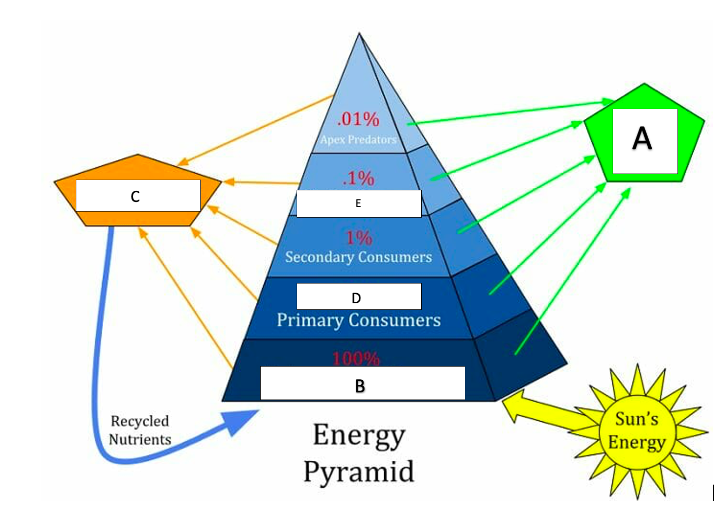
In the picture below, what fits best for A?
energy lost as heat due to cellular respiration
15
New cards
Which oceans experience low primary productivity regardless of ample sunlight and high carbon dioxide due to the fact that they have a thermocline year around?
tropical oceans
16
New cards
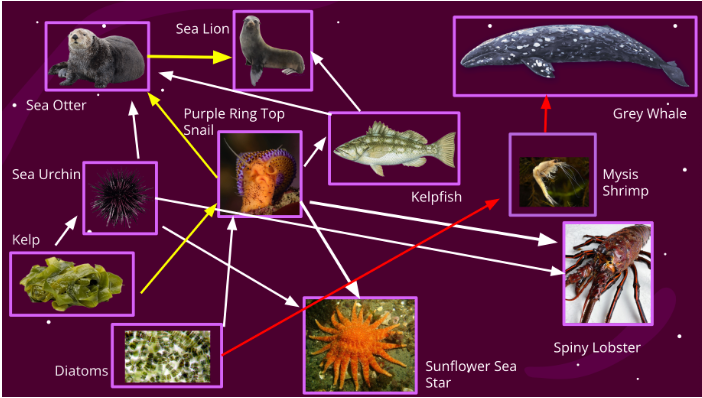
Following the red food chain in the web below, what is the grey whale in this chain?
secondary consumer
17
New cards
This prevents upwelling.
thermocline
18
New cards
Which of the following organisms would be considered nekton?
Whale shark
19
New cards
The buoy barnacle is unique in that it hangs downwards from the water surface, held up by a float of its own construction, and is carried along by ocean currents. What is this animal's lifestyle classification?
neuston
20
New cards
Which pelagic zone is most likely to contain phytoplankton?
epipelagic
21
New cards
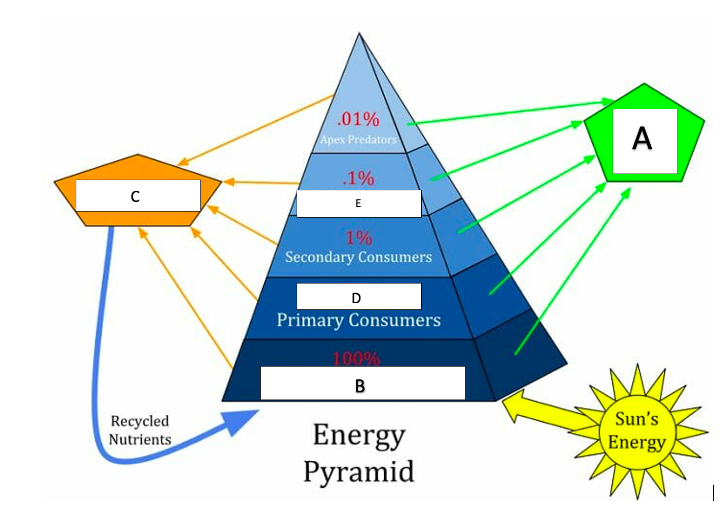
In the picture below, what is the best choice for E?
tertiary consumers
22
New cards
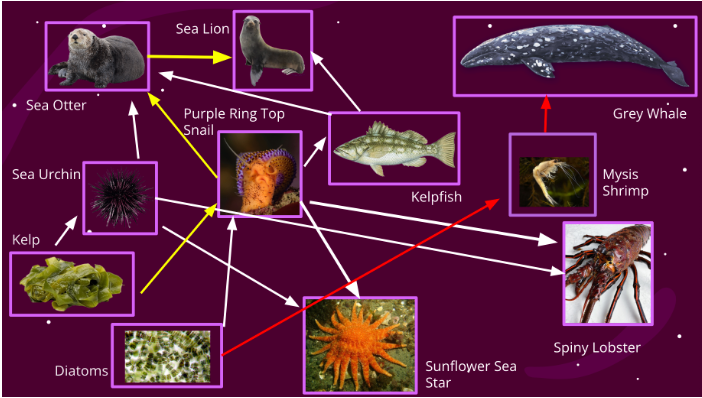
Looking at the food web below, which organisms are acting as the primary producers?
diatoms and kelp
23
New cards
These organisms are partially or completely buried in the sea floor.
infauna
24
New cards
Out of the three oceans, these two experience more primary productivity than the other one.
polar and temperate oceans
25
New cards
The pelagic zone…
includes the water zone and includes areas of the ocean that receive light (photic) and areas that do not receive light (aphotic).
26
New cards
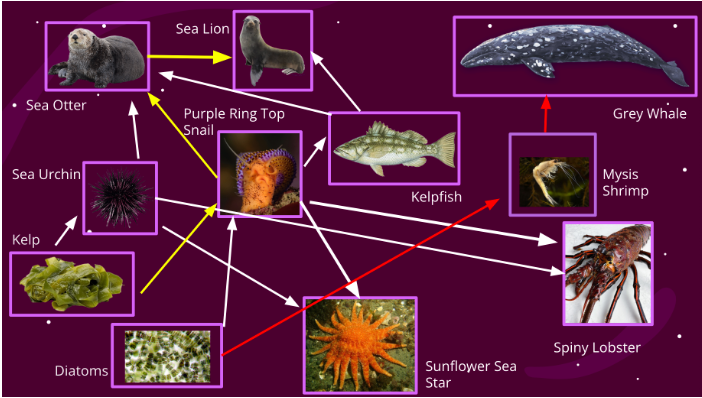
If pollution killed the kelpfish, which organism (in this food web) would be harmed the most and which organism population would increase?
harmed-sea lion, benefitted-purple ring top snail
27
New cards
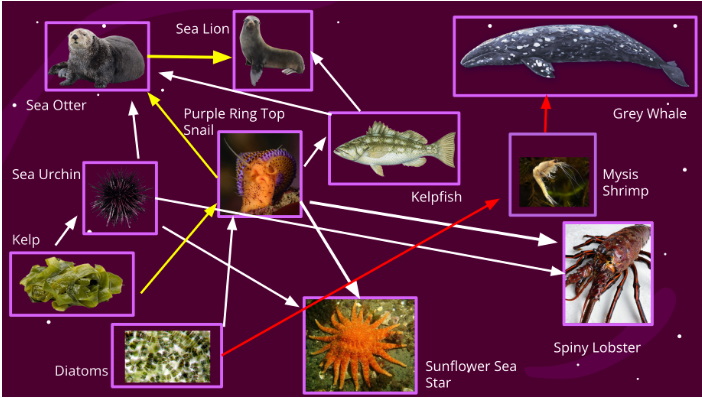
Following the yellow food chain in the web below, what is the sea otter in this chain?
secondary consumer
28
New cards
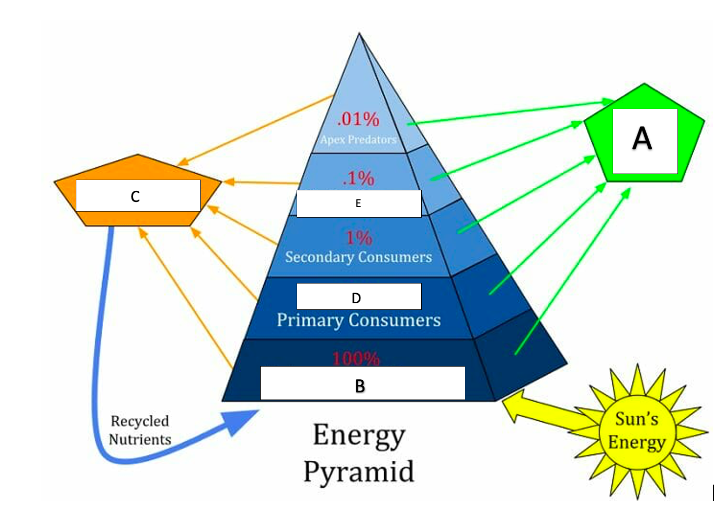
In the picture below, what process harnesses the sun's energy and makes food for the organisms located in the 1st trophic level?
photosynthesis
29
New cards
Pick the location with the least amount of nutrient availability.
oceanic tropical waters
30
New cards
Autotrophs…
include organisms who carry out chemosynthesis, are always found in the 1st trophic level in any energy pyramid, are also called primary producers, make their own food
31
New cards
Plankton…
include phytoplankton, zooplankton, and picoplankton, can sometimes swim but not against the current, and are the most important primary producers in the ocean
32
New cards
These are characterized by having one or two whiplike flagella that they use to move vertically in the water or to change orientation.
dinoflagellates
33
New cards
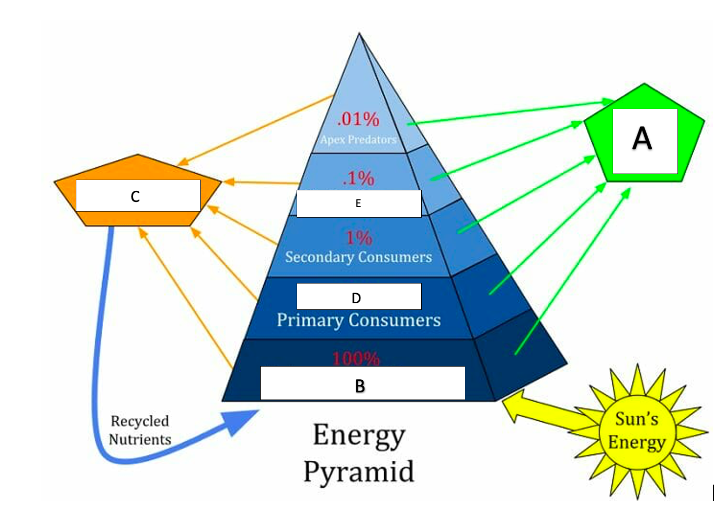
In the picture below, what is the best description for C?
decomposers
34
New cards
Zooplankton are…
consumers
35
New cards
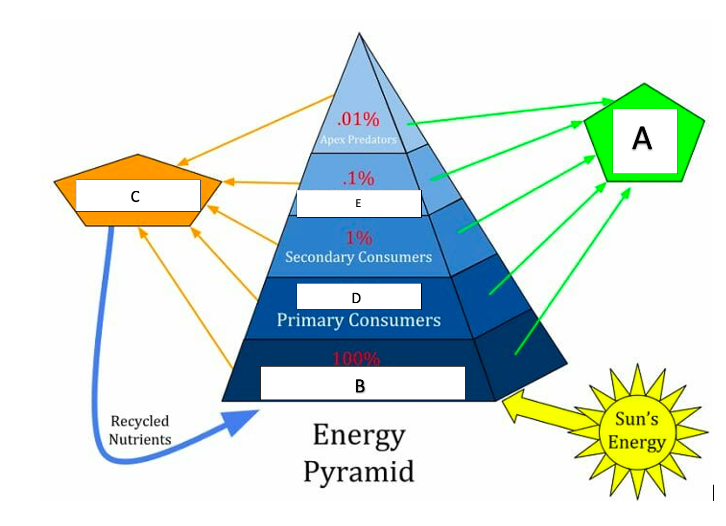
In the food web below, which is the best choice below for B?
autotrophs
36
New cards
These are responsible for upwards of 79% of all photosynthesis in water.
cyanobacteria
37
New cards
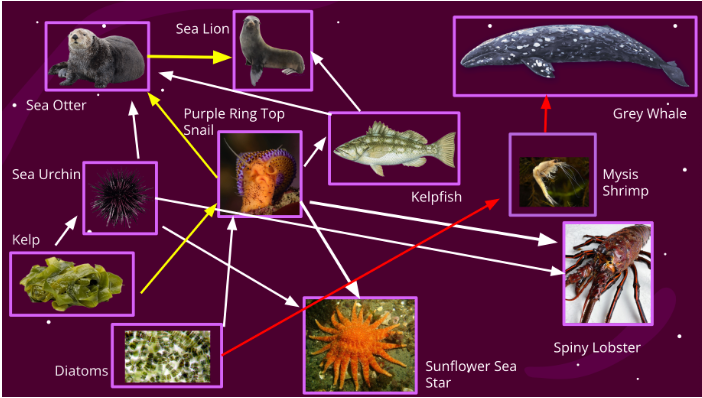
In the food web below, what organisms eat the purple ring top snail?
sunflower sea star, sea otter, kelpfish, and spiny lobster
38
New cards
Which benthic zone is found between the high and low tide mark (intertidal zone)?
littoral zone
39
New cards
How are colors absorbed as you go down in depth?
Red is the first to be absorbed, followed by orange, yellow, green, blue, indigo, and violet
40
New cards
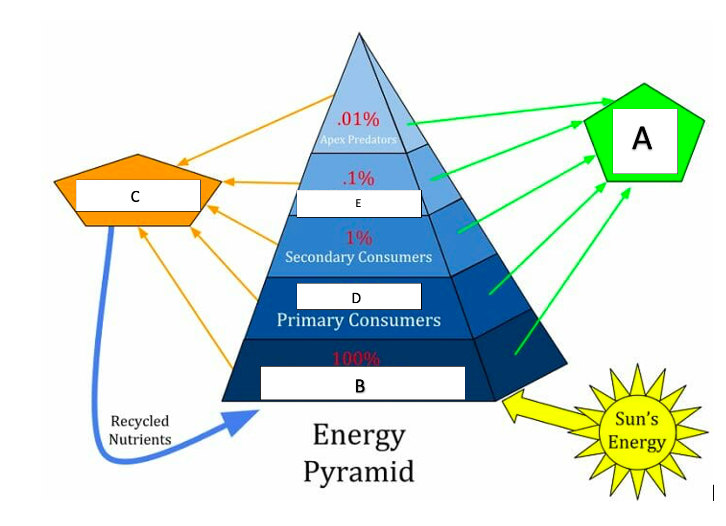
In the picture below, how much available energy is transferred to the primary consumers?
10%
41
New cards
Plants have stems, but algae have…
stipes
42
New cards
Which term/phrase does not apply to bacteria belonging to Domain Archaea?
common
43
New cards
This type of prokaryote is responsible for creating the majority of the oxygen in our atmosphere?
cyanobacteria
44
New cards
Which phylum provides a safe haven for juvenile organisms?
magnoliphyta
45
New cards
Indiana has large deposits of limestone from an ancient ocean during one of earth's geological time periods. Which of the following do scientists believe are most likely responsible responsible for creating these deposits
foraminiferans
46
New cards
While in his college Zoology class, Trey received his research paper back on the glass octopus (see below). Trey was upset to see that his professor had to correct his writing of the scientific name, in which he had written it as vetreledonella richardi. What do you think his professor said?
You need to capitalize the genus name and either underline or italicize the entire name.
47
New cards
What do land plants and seagrasses have in common?
roots, pollination, flowers, and stems
48
New cards
The biological definition of this term is "a group of organisms that can reproduce and produce fertile offspring".
species
49
New cards
Which type of algae is most like plants because it contains chlorophyll?
green algae
50
New cards
Which of the following is NOT a benefit of mangroves?
increases erosion
51
New cards
Zooxanthallae have a unique relationship with coral polyps in which the zooxanthallae provide the polyp with food that they make through photosynthesis and in return, the coral polyp provides the zooxanthallae with nitrogen and a place to live. This type of relationship can best be described as
mutualism, in which both organisms gain something from one another
52
New cards
Animals that belong to Phylum Echinodermata are recognizable by their radial symmetry and include starfish, brittle stars, sea urchins, sand dollars, sea cucumbers, and seal lilies to name several. Even though they all belong to the same Kingdom and Phylum, they all do not necessarily belong to the next more specific taxon group after the Phylum group. What is this next taxon group?
class
53
New cards
if an organism has no nucleus to house the DNA and non membrane organelles then
it could belong to Domain Archaea, it is a bacteria cell, it could belong to Domain Bacteria
54
New cards
This taxonomic group is defined as “a group of similar species.”
genus
55
New cards
Algae
is sometimes put in products we use and eat as a thickening agent, can be used as food for cows to reduce methane emissions,conatins pigments such as fucozanthin, chlorophyll, and phycoerythrin, and provides food and habitats for marine organisms
56
New cards
All of the following secrete a calcium carbonate shell EXCEPT
dinoflagellates
57
New cards
These autotrophic eukaryotes create calcium carbonate scales that can turn water milky white when shed. They are responsible for the White Cliffs of Dover in England
coccolithophores
58
New cards
Seagrass
helps to absorb nutrient runoff from the land
59
New cards
Some contain luciferin and luciferase
dinoflagellates
60
New cards
Red algae contains phycoerythrins that allow it to live at depth. Which of the following accurately describes the function of phycoerythrins?
phycoerythrins absorb blue light
61
New cards
Diatoms…
create glass-like two part shells that are unique to them
62
New cards
Brown algae…
contains an olive/green color due to the pigment fucoxanthin
63
New cards
This type of algae gathers in large drifting mats, creating floating ecosystems for neuston.
sargassum
64
New cards
Zooxanthallae live symbiotically within coral polyps, what are they a type of and name the relationship
type of dinoflagellate, mutualism
65
New cards
Which term/phrase DOES NOT apply to dinoflagellates?
contains frustules/shells of silicon
66
New cards
Giant Kelp
is part of the same phylum as sargassum, flas with the help of pneumatocysts, and is a type of brown algae
67
New cards
Function of pneuatocysts
floatation
68
New cards
Dinoflagellates…
possess a flagella utilized for movement, include some species capable of bioluminescence, and are crucial for the survival of coral reefs
69
New cards
An organism that can live in the depths of the ocean under high heat and pressure and are able to make food through chemosynthesis
is an extremophile belonging to Domain Archaea
70
New cards
What is the purpose of cellular extensions on radiolarians?
increase surface area
71
New cards
These have long feather like arms with tube feet and live in perpetual darkness feeding 24 hours a day.
sea lilies
72
New cards
Which of the following is NOT a way that sponges protect themselves from danger or damage?
some have stinging cells
73
New cards
A nematocyst
is a coiled harpoon like tube with barbs and toxins found inside of a cnidocyte
74
New cards
Which of the following organisms would need to molt to grow?
lobster
75
New cards
What are the two functions of the mantle?
shell production and water circulation
76
New cards
Sponges are considered animals becase they possess the following characteristics
heterotrophic, multicellular, and they have different cell types with structural organization
77
New cards
This type of mollusk is the only one in this phylum with the ability to use nematocysts as a defense mechanism. They do this by eating cnidarians without digesting the nematocysts themselves.
nudibranchs/slugs
78
New cards
This is a class of Phylum Mollusca that contains organisms that have little to no shell, use their siphon for directional movement, have advanced nervous systems compared to other invertebrates, and have the ability to change colors.
class cephalopoda
79
New cards
This is the only cephalopod with an exterior shell.
nautilus
80
New cards
Barnacles are unique crustaceans in that they are sessile, form a calcium carbonate shell, and live their lives upside down. To what class do they belong?
cirripedia
81
New cards
Besides sponges, what other organisms did we study also have spicules for protection and support?
soft corals
82
New cards
Which of the following are characteristics of phylum Mollusca?
mantle, foot, radula, and distinct larval stages
83
New cards
Cnidarians can take on two body forms: polyp or medusa. Which organisms are ONLY found as polyps?
corals, anemones, and sea fans (type of soft coral)
84
New cards
These arthropods are important sources of food to the great filter feeders of the sea (baleen whales, manta rays, whale sharks).
copepods and krill
85
New cards
Sponges have two major cell types. Which cell type is responsible for circulating water through sponge tissue?
collar cells or choanocytes
86
New cards
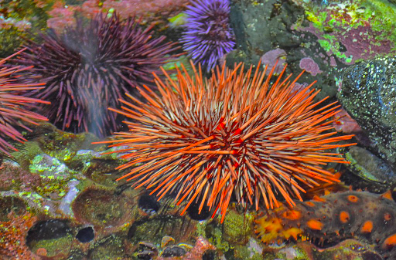
What class does this organism belong to?
class echinoidea
87
New cards
These are divided into a head, abdomen, and thorax, and have an exoskeleton made of chitin.
arthropods
88
New cards
What is not a characteristic of cnidarians?
exoskeleton made of chitin
89
New cards
Which is the most common characteristic of echinoderms that sets them apart from other phyla?
water vascular system with tube feet
90
New cards
Echinodermata meaning?
“Spiny skin”
91
New cards
Which structure is best described as “a muscular bad surround the gills and organs?”
mantle
92
New cards
Marine arthropods…
usually have an exoskeleton made of chitin (except nudibranchs), are important to the fishing industry, and have segmented bodies
93
New cards
When threatened, they expel a portion of their body for the predator to consume.
sea cucumbers
94
New cards
All of the following characteristics are true about cnidarians EXCEPT
They are always sessile
95
New cards
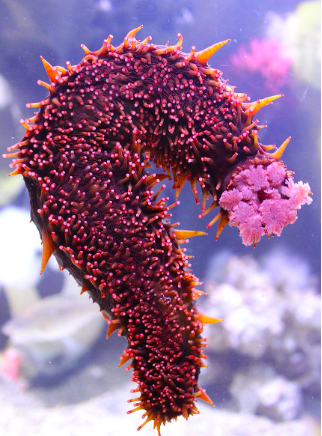
What class does this organism belong to?
class holothuroidea
96
New cards
Sponges have two major cell types. Which cell type is responsible distributing nutrients and acting as a simple immune system?
amoebocytes
97
New cards
Jellyfish…
contain stinging tentacles and are medusa shaped
98
New cards
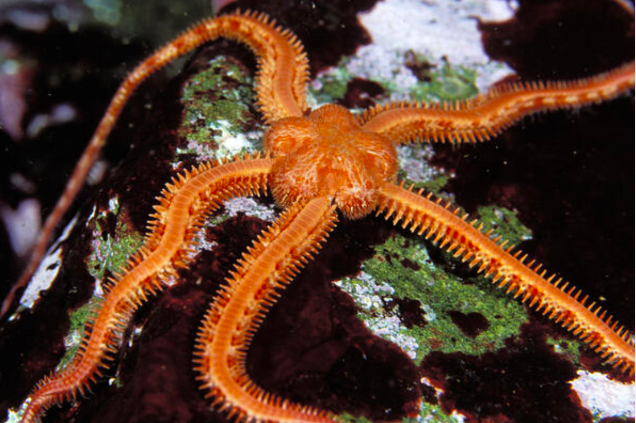
These are very similar to sea stars but have longer and thinner arms that allow them to move faster through their movement.
brittle stars
99
New cards
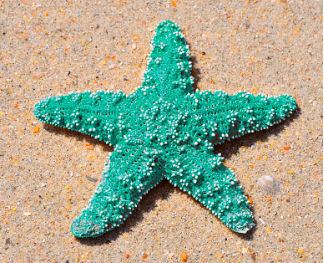
What class does this organism belong to?
class asteroidea
100
New cards
Sponges…
contain a protein called spongin, may be hermaphroditic in some species, may produce free swimming larvae, and are filter feeders